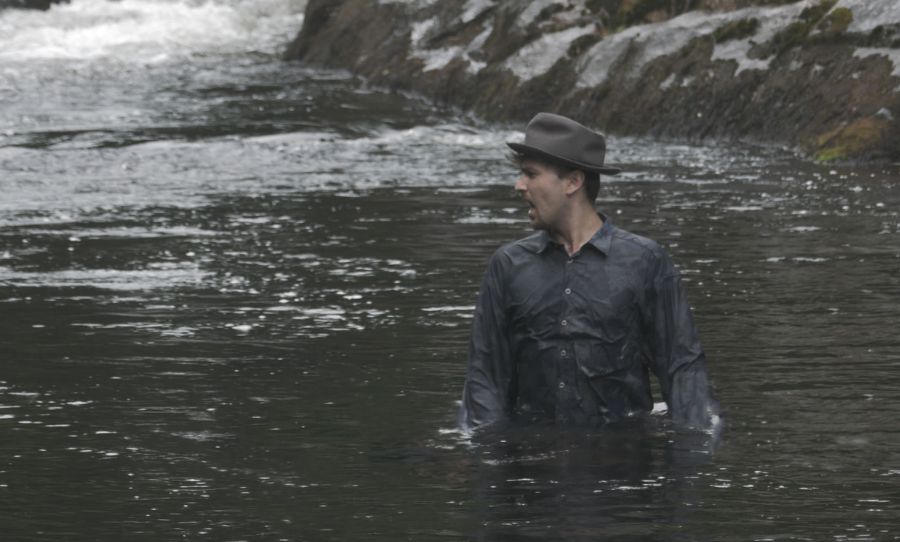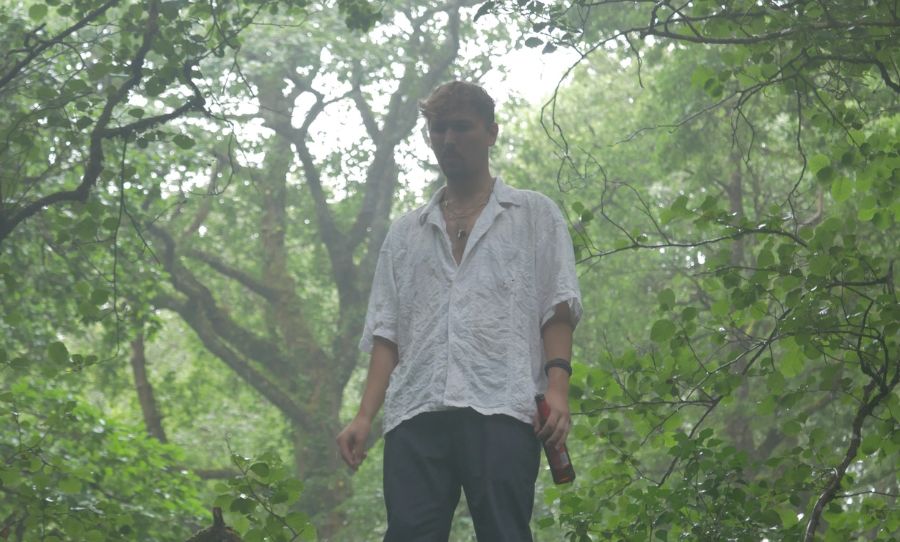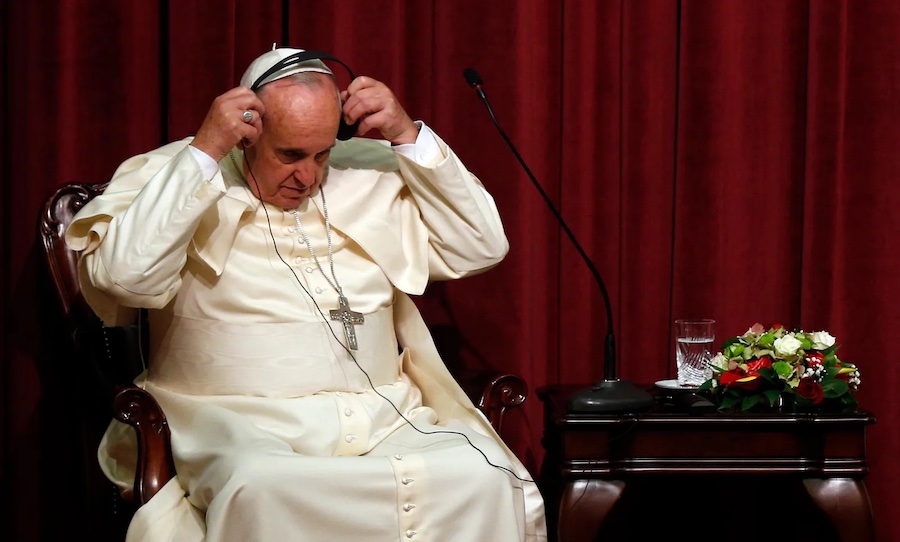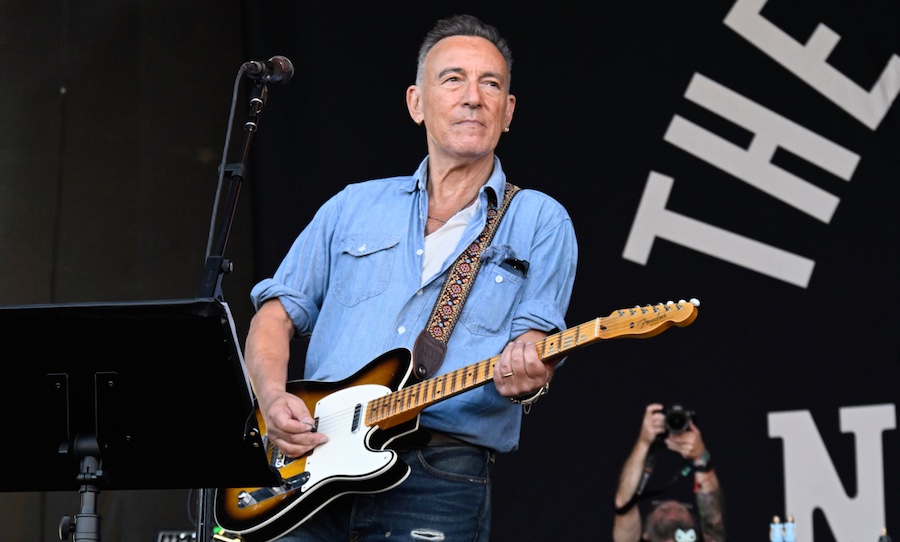Kid Lazuras’ essay delves into Utopia’s shadows, embracing contradictions with love & acceptance.
Amidst shadowy visuals, and sonic soundscapes influenced by Bristol’s electronic, post-punk, and new-wave scenes, Kid Lazuras’ ‘Utopia‘ isn’t just an album; it’s a philosophical exploration. From its introductory question—”What Is My Utopia?”—to the depths of escapism and self-acceptance, Kid Lazuras excavates the trenches of human experience.
Sit down with Kid Lazuras, with a mug of homebrew, and sink into the essay that is ‘What Is My Utopia? or, Black Dogs And Faceless Men’ where Kid Lazuras explores the dark undercurrents and glimmers of hope, echoing Albert Camus’ wisdom that the pursuit of happiness and meaning might be the very shackles preventing us from embracing our utopia—acceptance, love, and the fortitude to dance amid life’s contradictions.

A little home in the middle of nowhere on the crest of a valley. Backed by untamed woodland and fronted by an emerald river weaving below. We’ve got dogs, cats, goats, pigs, chickens, sheep, a couple mules, whatever other animals we find needing a helping hand. They’re not being farmed, they’re just free. We don’t need to exploit them. We have a little music studio where I can make my songs, and a little art studio where my partner can make her art. We don’t need to see people, or be seen by people, and only the people we love will find us. It’s quiet, bar the chatter of the animals and the wind rustling the tops of the trees that crest around little home. The sun is setting and we’re sitting on a blanket overlooking the valley, with oversized mugs of home-brewed beer, playing the kalimba for the chickens, singing songs about sandwiches. The chickens cluck along. The cauldron stews as the fire crackles, syncopating the purrs of the leaves above and waters below. The animals gather for the next song. The sun sets, the fire illuminates our little home. Seen by the Gods, forgotten by the World Beyond. Life is Happy.
Life is not Real.
***
Utopia is a funny concept. This idealised end goal, something to work toward but that we will never reach. Asking what it is can only hold the same kinds of answers as asking what happiness is. We’re obsessed with it, but the only thing we really know about it is we will never have it. I mean, in its Ancient Greek origins it quite literally translates as ‘no place’. So how are we supposed to work toward something we can’t have and know nothing about?
If the point of utopia is it is something to work toward, whilst knowing we will never get there, then the point of utopia is that always striving for it will gradually make things a little bit better. But that requires a necessary positive progression – that things actually do progress, and that progression itself is actually good. Nowhere in the structures of our lives now does it feel like things positively progress. We churn over the past, uncover new ways to hide, denying and exacerbating our ancient pains. We’re not positively progressing. We’re just trying to survive ourselves.
Confronting that thought is painful. If utopia is happy, why must we suffer so much to get there? Why do we bother when our attempts to get there are already condemned by its self-confessed impossibility? That feels the same as building a new world by first burning down the old, and we’re constantly reminded a society built on blood is destined to bleed.
So we drink, smoke, fight, fuck, sing, dance, obsess over the best distraction. Invent fantasies and live in those instead – you have control there, it feels safer. We survive the pain by dissociating completely from the structures of our worlds, but we have to grasp those structures if we are to ever have a chance of moving toward utopia. It really may be as simple as we live in unliveable pain or we die trying to escape it.
We’re masters of escapism. We do everything we can to avoid confronting ourselves and our worlds. So we shift what utopia is from this perfect world, an end result, a thing to work toward, to simply the closest thing that stops us from thinking, remembering, being, living. In that sense utopia is just the thing that lets us escape most successfully, self harm in all its bleak colours. So we escape our lives, our selves, our bodies and minds, the worlds and eyes of the Other. And that cycle manifests a taunting irony. What we do to ourselves to escape our worlds can hardly be called utopia, but it is the closest we’ll ever get.
That then is the concern of my debut album ‘Utopia’. An exploration of the black dogs and faceless men that taunt us. The traumas, the alienation, the nothingness, the disintegrated self. Our flailing attempts at escapism, forgetting that no matter where you escape to, you will always be there with
you. The tantalising possibility of something – anything – more. The realisation that perhaps it is only from the ashes that a new world can be built. The realisation that perhaps that’s ok.
***
So what actually is my utopia? I cannot reach it through escapism. I cannot reach it in a world where self-serving automatons are lauded whilst humans are dehumanised. My utopia cannot come from avoidance and escapism. And yet, it cannot come from engagement with the world around me. The Taoists and Stoics talk about balance, and maybe there is a clue in that.
Making ‘Utopia’ allowed me to explore the fabrics of my life, down to some of the darkest corners, and to try and make something beautiful from it. A little tree blooming in the ashes of those inescapable ancients.
It allowed a little more understanding, and a little bit of the positive progression toward whatever I fantasize happiness to be. Being able to confront pain without fear, and to try and turn it into
something good. To see that in sharing our alienation we are a little less alienated. Being able to understand, being able to love, and being able to forgive.
Music is a world where we can genuinely explore these parts of us, unshackled of the thoughts and demands of distractions, constraints, and judgments. Rejecting the bad faith we embed in our shackles, and seeing that blind expression – the enactment of our freedom – unshackles us. Music allows us to access ourselves with a depth and acceptance that we otherwise never can. There’s no point in hiding from or fighting the past. You can only move forward with understanding and acceptance. And I think only art is capable of accessing those parts of our being with honesty, clarity, but more importantly with love and security.
Only art draws us closer to ourselves. It allows us to engage with the things that break us. It’s a place that makes the pain safe to feel.
Utopia is being afforded a chance to accept your world, realise your power, and hold high the hope for beauty to always rise from the ashes. Utopia is confronting the things that have always defined you, knowing them, forgiving them, and leaving them behind. Utopia is being able to accept yourself. Self-acceptance takes self-understanding. Self-understanding, I think, is only possible with art. In that sense, my utopia was making ‘Utopia’. It isn’t happy, but it grows to accept, and in acceptance it becomes strong.
Utopia is to embrace the black dogs and faceless men that taunt us, to simply reject the questions they demand us to answer, and to kill them with kindness. As Albert Camus said, you’ll never be happy if you continue to search for what happiness consists of, and you’ll never live if you’re looking for the meaning of life.



